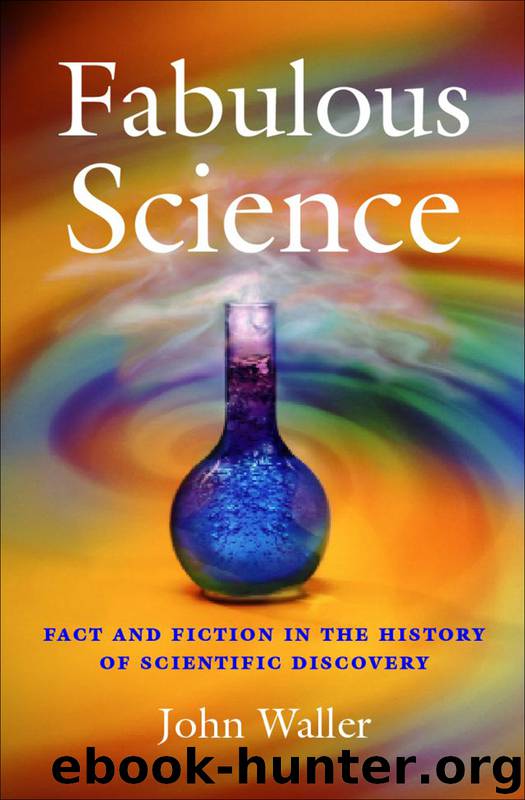Fabulous Science by Waller John;

Author:Waller, John;
Language: eng
Format: epub
Publisher: Oxford University Press
Published: 2002-03-13T16:00:00+00:00
8
WAS JOSEPH LISTER MR CLEAN?
Left: Joseph Lister, first Baron Lister of Lyme Regis (1827–1912).
The first method of preventing infection during an operation was developed by Joseph Lister…. Lister insisted that the operating theatre was kept clean, that the surgeon wore clean clothes, and that instruments were regularly disinfected.
At first Lister was regarded as an eccentric and nurses resented the extra work that his obsession with cleanliness caused. But deaths from blood poisoning and gangrene were reduced and before he died, Lister’s services to medicine were recognized and he was awarded a knighthood. Today the terms, ‘Before Lister’ and ‘After Lister’ are used to describe surgery.
BBC’s website, Medicine Through Time.
What do Jesus Christ, Vincent van Gogh, Albert Einstein, Winston Churchill, and Adolf Hitler all have in common? Although seeming to differ in almost every way, they each share at least one characteristic. Before achieving recognition, fame, or notoriety they are all seen to have spent a period in the wilderness, real or figurative. This image is a very common feature of Western portrayals of the hero or great man. An initially obscure individual performs a remarkably prescient and significant mental or physical feat. They then undergo their wilderness years, before at last their genius is recognized and their names are crowned with immortality. A recurrent theme in biographies—and especially hagiographies—of artists, writers, prophets, dictators, and scientists, it also figures largely in what are explicitly works of fiction.
It is not hard to identify reasons why the image has remained so popular despite seemingly endless reworkings. First, it embodies the wish-fulfilling fantasies many of us privately nurse of being ‘discovered’. It also reflects an egocentric tendency to overlook parents, teachers, peers, and benefactors when reflecting on our own successes. More importantly, the ‘obscurity to immortality’ story is perfectly formulated to convey an impression of heroism. Initial rejection straightaway implies both originality and unusual perspicacity. The suggestion of a prolonged period of suffering for the sake of an idea connotes a selfless commitment to the Truth. And an ability to bear the slings and arrows of anonymity and constant repudiation proves that the individual has the requisite mettle to enter the Pantheon of Heroes. Kipling fittingly identifies the ability to ‘trust yourself when all men doubt you’, as one of the prerequisites of true manhood.
Most of the names adorning the gallery of the Wellcome Institute’s History of Medicine library in London’s Euston Road immediately conjure up these images of far-seeing genius and altruistic self-sacrifice. We have already seen how John Snow and Gregor Mendel were forced into this romantic schema. But in this particular essay I will focus on the paradigmatic example: the Essex-born surgeon Joseph Lister, son of a Quaker wine merchant and amateur scientist, and a man immortalized by The Lancet in 1889 for having ‘revolutionized surgery’. Three decades earlier, this Lancet editor explained, Joseph Lister’s introduction of ‘antiseptic’ practices had inaugurated a new age in surgical practice. His famous antiseptic carbolic spray symbolized, it went on, both his earnest and pioneering
Download
This site does not store any files on its server. We only index and link to content provided by other sites. Please contact the content providers to delete copyright contents if any and email us, we'll remove relevant links or contents immediately.
| Administration & Medicine Economics | Allied Health Professions |
| Basic Sciences | Dentistry |
| History | Medical Informatics |
| Medicine | Nursing |
| Pharmacology | Psychology |
| Research | Veterinary Medicine |
The Immortal Life of Henrietta Lacks by Rebecca Skloot(4248)
An American Plague by Jim Murphy(3628)
The Gene: An Intimate History by Siddhartha Mukherjee(2926)
The Emperor of All Maladies: A Biography of Cancer by Siddhartha Mukherjee(2921)
The Fate of Rome: Climate, Disease, and the End of an Empire (The Princeton History of the Ancient World) by Kyle Harper(2864)
Rebecca Skloot by The Immortal Life of Henrietta Lacks(1878)
Stiff - The Curious Lives of Human Cadavers by Mary Roach(1730)
The Great Influenza by John M Barry(1709)
The Vaccine Race by Meredith Wadman(1559)
Undue Risk by Moreno Jonathan D.;(1518)
Three Cups of Tea by Greg Mortenson(1511)
Quackery by Lydia Kang(1485)
The Mystery of the Exploding Teeth by Thomas Morris(1485)
Hero by Michael Grant(1469)
Autism's False Prophets by Paul A. Offit(1446)
A Journal of the Plague Year (Oxford World's Classics) by Daniel Defoe(1436)
Steroids: History, Science, and Issues by Standora Joan E.; Bogomolnik Alex; Slugocki Malgorzata(1424)
Extremes: Life, Death and the Limits of the Human Body by Fong Kevin(1417)
The Vaccine Court by Rohde Wayne(1408)
